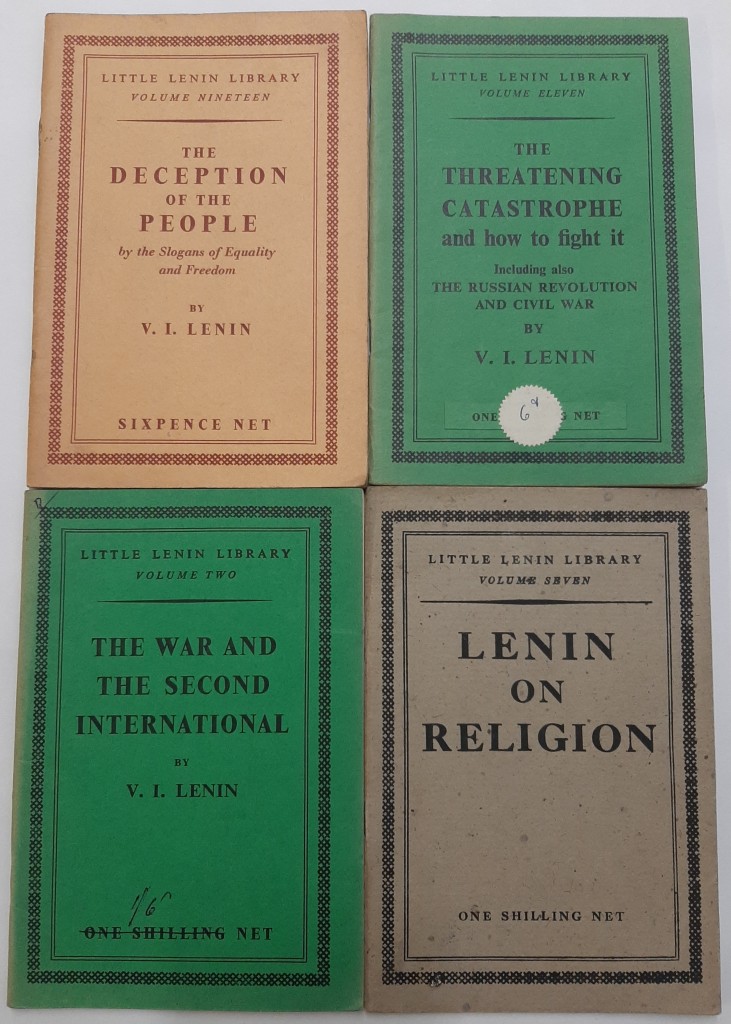This blog post marks the centenary of the death of Lenin. Vladimir Ilyich Ulyanov, better known as Vladimir Lenin, 22 April 1870 – 21 January 1924, was a Russian revolutionary, politician and political theorist. He served as the first and founding head of government of Soviet Russia from 1917 to 1924, and of the Soviet Union from 1922 to 1924. Under his administration, Russia, and later the Soviet Union, became a one-party socialist state governed by the Communist Party. Ideologically a Marxist, his developments to the ideology are called Leninism.
Charles Parker Archive (MS 4000)
It will come as no surprise to those who know about the Charles Parker Archive (MS 4000) at Archives & Collections, that Lenin makes his appearance there. If you are not familiar with this wonderful collection, do check the online catalogue.
People Today: Caleb Lawden Moore, was a radio programme produced by Charles Parker for broadcast on the BBC Home Service, 12 April 1962. The programme was edited and introduced by Brian Vaughton, a colleague of Parker’s at the BBC (MS 4000/2/85).
Caleb Moore was described in the publicity as,
‘…now a man of 86, he is a manufacturing jeweller in the jewellery quarter of Birmingham. Caleb Moore’s great interest has always been precious stones, especially diamonds, and he is still considered one of the accepted experts on stones in the trade.’
He was named Caleb Lawden after one of the oldest firms in the jewellery trade, friends of his grandfather. His father was also a jeweller, designing pieces at home. This is a quote from the tape recording:
‘You used to have the Russian Famine [1891-1892], and we used to collect in the streets – for Russia.
When I met Lenin, his cousin used to come down from London and show me his diamonds, he was in the diamond game – and I used to talk to him and know so much about diamonds. Lenin came down before he went to Russia.
Just an ordinary little chap, little but baldy – high forehead you know……. He was only an ordinary individual. He used to smoke cigarettes – black tobacco, and his nails were black half way down, this nicotine stuff out of the cigarettes you know……………He’s the las man youd have picked out to start a revolution…………………He was a calm, collected sort of man, not much to say, but he must have had a wonderful depth of character.
My sister, she picked up the [Daily] Mirror and she said ‘Look here, it’s that Lenin, in the cause, I got his picture at the start of the Revolution.’

The Charles Parker Archive also includes 43 booklets by Karl Marx, Lenin, Engels, Stalin and others on Marxism (MS 4000/3/12 Politics). Parker was also part of a Marxist Study Group in Birmingham, 1965-1968, led by Professor George Thomson, (Professor of Classics at the University of Birmingham) (MS 4000/1/8/12).
George Thompson Papers (MS 2672)
MS 2672/Box 33 includes a notebook of George Thomson’s on Lenin. It has quotes from Lenin’s books: ‘The Proleteriat and the Peasantry’; ‘From the Bourgeois to the Proleterian Revolution’; ‘The National Question’; and ‘The Two Roads’. There’s a book called ‘George Thomson in Birmingham and the Blaskets’ by Maggie Burns, once a Librarian in Local Studies. It’s available in the Birmingham Collection at 78.1 Tho in the Heritage Research Area.
Lenin was embalmed after his death, against his wishes, and his body put on display in a mausoleum at the Kremlin. My late husband and I paid our respects on a visit there in the early 1990s. It was too late then, to ask him what he thought of Birmingham……
Fiona Tait


[…] This week the Library of Birmingham’s blog marks the centenary of the death of Vladimir Lenin, on 21 January 1924. Reseacher Fiona explores connections with Birmingham documented in the Birmingham archives, including the Charles Parker Archive. Read more here https://theironroom.wordpress.com/2024/01/22/lenin-and-birmingham […]